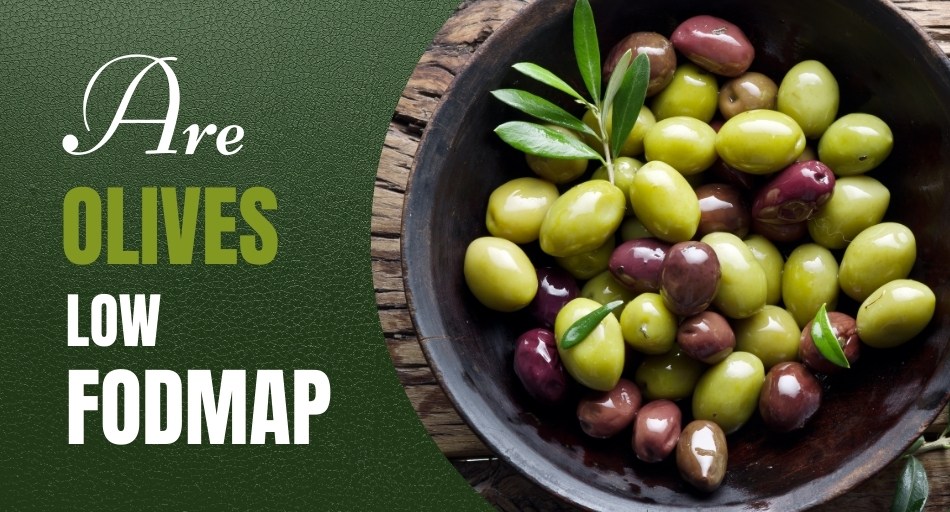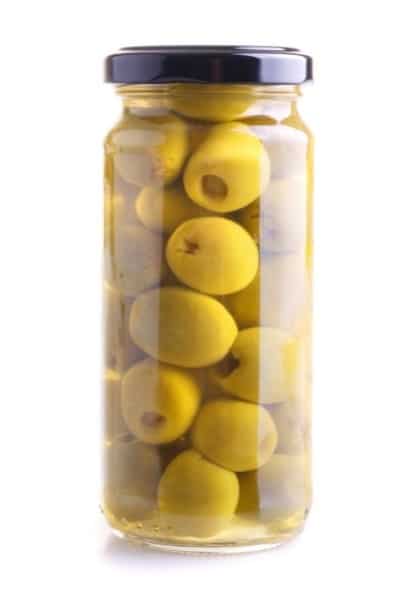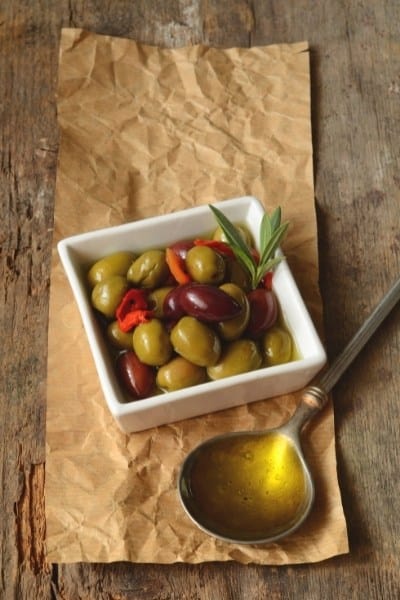If you struggle with irritable bowel syndrome (IBS), you’ve definitely considered trying a low FODMAP diet.

This kind of diet limits your consumption of indigestible carbs that are linked with more severe IBS symptoms.
Many foods contain FODMAPs, so sometimes, it might be hard to figure out which ones you can consume. Even foods that don’t primarily contain carbs can be high in FODMAPs.
For example, let’s look at olives. They mostly provide you with fat but still contain some carbs. So, are they safe for a low FODMAP diet? Or should they be avoided?
Table of Contents
Are Olives Low FODMAP?
Luckily for all olive lovers, they are actually a low FODMAP food as long as you stick to a recommended serving and do not overdo it. You can actually consume quite a few olives, even on a very strict low FODMAP diet.

In addition, olives are rich in various nutrients like vitamin A, healthy fats, and iron. They also contain some valuable plant compounds that can reduce your risk of various health conditions.
How low in FODMAPs are olives?
Olives don’t contain too many carbohydrates, so they’re also low in FODMAPs. On a low FODMAP diet, you can consume about 15 olives or a ½-cup serving in a single sitting.
This is a decent amount, so you can safely include olives in your diet without any IBS symptoms.
On the other hand, remember that this serving of olives also provides you with around 250 mg of sodium, which is around 11% of your daily recommended need for this nutrient.
While sodium is important, it raises your blood pressure if you consume too much of it. This, in turn, increases your risk of strokes and heart attacks.

Sodium may also lead to inflammation in your digestive system, so it can make your IBS worse.
So, make sure to stick to the recommended serving of olives.
Can you eat olives on a low FODMAP diet?
Olives are considered a low FODMAP food. So, you can safely include them in a diet low in these indigestible carbs without worrying about worsening your IBS symptoms.
But it’s still important to practice moderation, as they do contain FODMAPs. So, if you eat too many in one sitting, you can easily load up on too many FODMAPs, triggering the symptoms of your IBS.
Are black olives low in FODMAPs?
Black olives are allowed in the same serving size as green olives. This is because they contain similar amounts of FODMAPs, so you can consume both.

Black olives are also slightly higher in calcium, so they can help you load up on this nutrient. But remember that they’re still very high in sodium, which is bad for you in large quantities.
So, make sure to consume olives in moderation and as part of a healthy, balanced diet.
Is olive oil low in FODMAPs?
Olive oil is safe for a low FODMAP, IBS-friendly diet. As long as you stick to standard serving sizes, you shouldn’t experience any digestive system issues.
But make sure that the olive oil you’re buying doesn’t contain garlic or onions. These two ingredients are very high in FODMAPs. So, they should be completely avoided on a low FODMAP diet.
Choosing olive oil instead of regular cooking oil can also be very good for you. For example, it’s rich in healthy, monosaturated fats, which help keep your heart healthy.

Olive oil also contains a lot of antioxidants and anti-inflammatory properties. So, it’s a great addition to any diet.
Are olives good for you?
Most calories in olives come from fats. While this might worry some people, the fats found in olives are actually very healthy.
In fact, olives contain oleic acid – a type of monosaturated fatty acid that has been linked to decreased inflammation and a lower risk of heart disease.
Because of that, olives are actually good for your cardiovascular system.
Olives also contain a lot of vitamin E, which acts as a powerful antioxidant. Such plant compounds help flush out free radicals from your body, preventing oxidative damage to your cells.
This lowers your risk of several chronic conditions like heart disease, cancer, and diabetes.
On its own, vitamin E helps maintain healthy skin and eyes while strengthening your immune system.
This micronutrient is also fat-soluble, so your body is more likely to absorb it all if you get it from high-fat foods like olives.
Plus, olives contain another fat-soluble nutrient – vitamin A. It helps protect your eyes from night blindness and age-related macular degeneration. Adequate levels of vitamin A also reduce your risk of acne, promoting healthy skin.
You would have to eat a lot of olives to reach your daily need for these nutrients, though. But it’s still important to know that eating them provides you with some of them.

Aside from nutrients, olives contain plenty of plant compounds that have wonderful health benefits.
For example, unripe olives are rich in compounds linked to a reduced risk of heart disease, lower blood pressure, and reduced inflammation.
Some of these substances may even help regulate blood fats and prevent liver damage.
In addition, olives, especially black olives, are an excellent source of iron. This micronutrient is important for the formation of hemoglobin, a protein that helps transport oxygen throughout your body.
Getting enough iron also reduces your risk of anemia and improves your energy levels.
So, eating olives can bring your lots of health benefits – as long as you don’t consume too many of them. This is important due to their sodium content.
Conclusion
Olives contain barely any FODMAPs. So, they’re safe for people with IBS as long as you stick to the recommended serving.
You can also consume both green and black olives without worrying about any digestive system issues.
What’s more, olives are rich in plant compounds and several nutrients. Thanks to that, eating them can help improve your health and lower your risk of several health conditions – as long as you don’t overdo it.
Sources: Nutrition Data, National Library of Medicine, Wiley Online Library, and Science Direct
